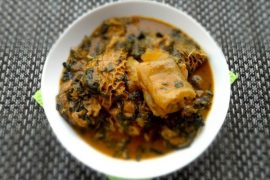How to prepare ‘Ofe Owerri,’ the jewel of South-Eastern soups

By Chiamaka Ajaemo
Health is wealth and a large part of staying healthy is related to what we eat, our diet. The consumption of good and nutritious food keeps us looking good and prevents diseases as well. There are various nourishing soups eaten all over the Igboland and Ofe owerri is not the least of them. In fact, I see this soup as the mother of all soups. See reasons with me.
Ofe Owerri (Owerri soup) is a sumptuous, nutritious and delicious Nigerian soup which is specifically native to the Igbos from Imo state especially those from Owerri, the capital city. This soup stands as a unique dish because of its nutritive content, flavour, method of preparation and its potential medicinal / therapeutic value. Any Owerri festivity without this soup is not complete. No wonder the Owerri people call it the jewel of the southeastern soups.
The chief ingredients such as vegetables, assorted meat, snail, dried fish and stockfish used in the preparation of this soup make it a mouth watering dish. We all know it is vital to eat vegetables due to their nutrient contents. Vegetables are loaded with vitamin A, C, E, folic acid and dietary fiber which are all essential for preserving good health. These vitamins help in fighting diseases and infections, provide good vision and maintain a healthy skin.
Aside the nutrients gotten from the vegatables, Ofe Owerri is also rich in protein and calcium which are key in maintaining a healthy living. If you are the type that takes extra care of your health, then you need consume this soup regularly. This soup is ideal for everyone, especially, pregnant women, nursing mothers and convalescing patients who desire to recover fast from their illness and build a strong immune system.
Traditionally, Ofe Owerri has two major vegetables: Ugu and Okazi leaves. Other vegetables such as Uziza and Oha, sometimes used in making this soup are based on the cook’s taste and preference.
Enough of the talking, oya! Let me teach you how to make this jewel. Here are the steps that can serve as a guide-post to preparing a typical Ofe owerri. The recipes listed can serve a family of six.
A traditional Ofe Owerri recipes/ ingredients are:
1.5kg of assorted meats (cow tail, skin, intestines, goat meat etc)
6-10 pieces of snails
1 medium sized stock fish head (Okporoko)
2 medium dry fish (Azu Nkrurkunku or Azu Asa)
1 cup of ground crayfish
2 tablespoons of dry ground pepper (Ose ikpo)
4-5 pieces of cocoyam (Ede) substitute are Achi or Ofor
1 wrap of Ogiri (Locust beans)
1 big bunch of Ugu (Pumpkin) leaves
1 medium bunch of Okazi leaves
1 small bunch of Uziza leaves (optional)
2 cooking spoons of palm oil
1 medium sized onion
Salt
4 cubes of knorr maggi
Directions/ Instructions:
Step 1: Wash your vegetables thoroughly for about two to three times with clean water separately (you can add a little salt to the water depending on how dusty the vegetables are), then slice thinly and put them into different sieves to drain water and set aside. However, it is basically preferable to slice the Okazi leaves before washing it.
Step 2: Wash the cocoyam thoroughly with water to remove every trace of sand and dust. Place it into a small pot with lots of water maybe, two medium cups of water, do not add salt and allow boiling for 10-15 minutes. When the cocoyam is cooked, peel off the skin either with your bare hands or knife, then, put it into a mortar and pound into a paste. During the pounding, add a table spoon of palm oil to the paste because of the sticky nature of the cocoyam. Adding the oil keeps the cocoyam from sticking to the mortar as well as brightens the colour of the soup. Once the cocoyam appears smooth scoop it out of the mortar and set aside. (This serves as the soup thickener)
STEP 3: Wash the meats with clean water thoroughly and place into a big pot. It is better to start with the tougher meats like the cow skin, tail, intestines etc first before the softer ones like beef or snails. After washing them, season with two cubes of knorr maggi, onion, half tablespoon of pepper and an adequate amount of salt to taste. Start boiling them with a generous amount of water. Remember to wash the snails with alum to remove the slimy fluid from the body. Soak the stockfish head in hot water for about 10 minutes to soften it and remove dirt from it. Also, wash the dry fish with warm water and set aside.
When the tougher meats have boiled for 15 minutes, they have become slightly tender so, add the stock fish, snails and other soft meats and let it boil for another 15 minutes till they all become soft. Take note, the stock from the meats will serve as the base for the soup. So endeavour to season it well. This will save you the stress of adding more seasoning later if it is as tasty as you want it to be.
STEP 4: Once the meat is cooked, add 3-4 cups of water to the meat stock or the cooked meat. Then add the cocoyam and stir, let it cook and thicken for 5 minutes. After this add the palm oil, dry fish, crayfish (make sure you wash it because of dirts), ogiri, salt, 2 cubes of knorr maggi, and pepper. Cover the pot and let it cook for 2-5 minutes until the oil combines with the soup and loses its raw taste. At this stage, you will also notice a colour change- a light shade of orange when the palm oil has bubbled vigorously. You can taste the soup to know if you have your desired amount of the seasoning. If not, add more according to your taste.
STEP 5: Add the vegetables starting first with the okazi because it is stronger, then uziza and ugu. Stir the soup after let it simmer on low heat for 5 minutes then turn off the cooker. Make sure the soup is not too thick or light.
There you have it! Your delicious Ofe Owerri is ready, serve with any swallow of your choice – Fufu, Pounded yam, Eba, Semovita, Wheat etc. Enjoy eating!!!
Endeavour to make this dish for your family or loved ones this weekend. I anticipate your reply. Watch this space next week for another recipe to a delicious dish. Eat right, remain healthy!


